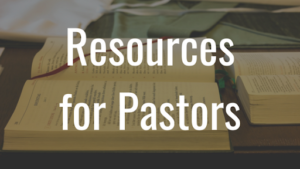THE CHURCH
A New Testament church of the Lord Jesus Christ is an autonomous local congregation of baptized believers, associated by covenant in the faith and fellowship of the Gospel; observing the two ordinances of Christ, governed by His laws, exercising the gifts, rights, and privileges given them by His Word, and seeking to fulfill the great commission by taking the Gospel to the ends of the earth. Its scriptural officers are pastors, elders, and deacons. While both men and women are gifted for service in the Church, these offices are limited to men as qualified by Scripture.
The New Testament also speaks of the Church as the Body of Christ, which includes all the redeemed of all the ages, believers from every tribe, language, people, and nation.
Acts 2:41-42,47; 5:11-14; 6:3-6; 13:1-3; Romans 1:7; 1 Corinthians 1:2; 3:16; 5:4-5; Ephesians 1:22-23; 2:19 Philippians 1:1; Colossians 1:18
Who created the Church?
The Church is a creation of Christ. He chose to build His church, Matthew 16:18, using ordinary men, who, in turn, would become future Apostles, Evangelists, Pastors, Teachers, Missionaries, and Leaders (Ephesians 4:11-13). He, (under their leadership) would put together members of His body, according to the specific tasks He has designed for them to perform (1 Corinthians 12:18). It was always Jesus’ plan for Church leaders and members to work together. They should have a deep respect for one another because everyone (leader and member) has been placed in a Church for a specific reason. Jesus created His Church with the foreknowledge that there would be vast differences in cultures, nationalities, languages, and governments. However, He also foreknew that His plan, for “The Church,” could thrive beyond these differences.
What is “The Church”?
The Church is known as the living body of Christ with its leaders and many members (1 Corinthians 12:27). In the original Greek, the word used is Ekklisía, which, when translated, means meetinghouse or Church. However, we see this same Greek word used when the writer is talking about we members who make up The Church. It is not a building or an organization. It is a group of people joined together and forming a living body. Paul always refers to the Church as a body and goes on to explain the way Christ envisioned His Church to be full of life, ministry, and energy.
Who is the Head? Christ is the Head of the body (The Church)
Ephesians 1:22; 4:15-16. Paul explains, all matters with, “The Church,” is to come under His lordship.
All the members of a church are uniquely related.
Every Christian, upon Salvation, is grafted into the WHOLE body of His Church. It is important to remember that Paul does not refer to alone or a single body of believers, but all believers are to make up His Church Ephesians 4:11-16; 1 Corinthians 12. Every Church is interdependent on one another. We all need each other. Sometimes this is a tough one to realize the matter of ‘need,’ but it’s there in Scripture and there in reality.
The Church is to carry the message of Christ to our world.
We all are responsible for carrying out the Father’s redemptive plan. Matthew 28:18-20; 2 Corinthians 5:17-20. Believers are to be “God’s fellow workers”- 1 Corinthians 3:9.
Now that we know more about the Church, the question remains, how should it function? No clearer directive can be found than in Romans chapter twelve, on how Christ desires His body of believers to perform.
Romans chapter twelve describes a new kind of priesthood. It is based upon what Paul has written when he instructs the Roman believers, all church believers, that we are all priests, and should give ourselves over to God for service. He includes that we are not to be conformed to the world’s thinking, but we should be transformed into God’s way of thinking.
Our priesthood and spiritual transformation should be based on biblical thinking and puts all believers in a position to serve God as we serve the Church with humility along with our spiritual gifts, which come to us by faith. Remember, it is Christ who saves us, and grafts us into His Church!
As Christians, we live around each other and serve God as a united body of believers. We are to demonstrate godly love, Christ-like attitudes, and relationships with each other. Also, we are to grasp the responsibility we have to all people, including non-believers. We are not to not take revenge; we should respect what is right and live in peace with people whenever possible. We should always do God’s good, that we find in the Bible, instead of the prevalent evil in the world.
The Following is a Basic Outline of Romans Chapter Twelve
Romans 12:1-2. Here we find God making all Christians into priests of a new order. As believers in Christ, and His sacrifice on the cross, we are to no longer sacrifice animals. Instead, we give ourselves to God and are to perform our priestly service while at the same time, we are to be transformed and changed by the renewal of our worldly way of thinking. We are to become a living sacrifice by being living a holy life, a life that is pleasing to God. In other words, the sacrifice of our bodies and minds to God because our bodies have become the house in which His Holy Spirit dwells.
Romans 12:3-8. As stated above, we have become members of the body of Christ. As we renew our minds, the Holy Spirit will give us, as He decides, a spiritual gift. We are not to confuse our spiritual gifts with a calling to serve Christ. We all are called to serve Christ and to proclaim the Gospel. However, each of us is given the grace and responsibility to serve Christ, along with other believers, with a spiritual gift, according to the faith that He gives us in which to serve. However, Paul does include a qualifying statement with each gift to encourage and guide every believer in their Christian ministry.
Romans 12:9-16. Paul lays a foundation of presenting ourselves to God, being transformed by renewing our minds, serving with humility, and serving with the spiritual gift or gifts imparted to us, and having faith in Christ for that service. Paul then proceeds to give us a list of twenty characteristics that our actions, attitudes, and relationships with other members of the Church should include.
Romans 12:17-21. In the final five verses, Paul now expands his instructions to the Church by giving eight ways of how we are to think toward and treat everyone, believers, and non-believers. Included are the responsibilities we have to all people, those who are a part of the Church, and those that are not. We are never to take revenge; we should respect what is right, we are to live in peace with everyone if possible, we should always do God’s good, that we find in the Bible, instead of the evil that is prevalent in the world.
Through the outline above, though brief in its description, we can form many Tenants, which, in turn, enables us to create solid Doctrine for the Church. They include; the priesthood of all believers, spiritual growth, humility, the Body of Christ, The Church, spiritual gifts, Godly love, relationships among all believers and non-believers, testing and suffering, encouragement, Biblical and non-biblical (world views), and the life of faith.
In conclusion, we encourage all Christians to study Romans, chapter twelve, thoroughly. When we add the short epistle of Ephesians, one may come away with a clear understanding of how Christ expects His Church to serve as His unified body of believers.



